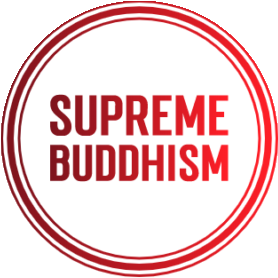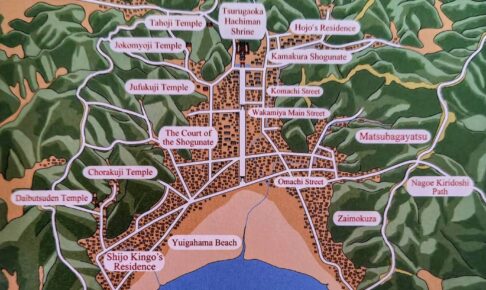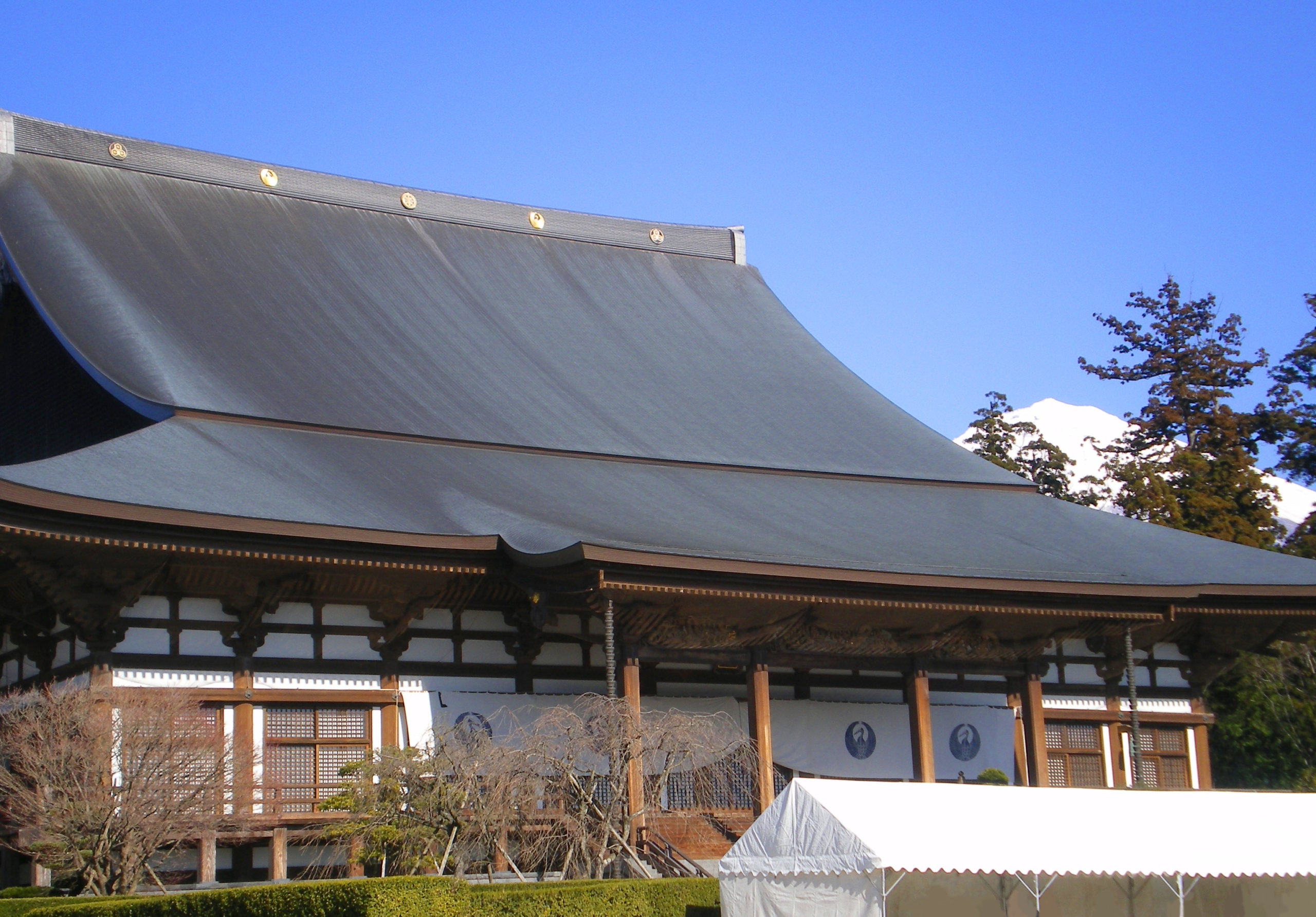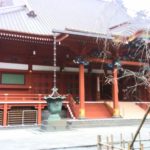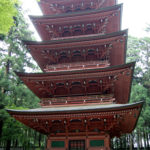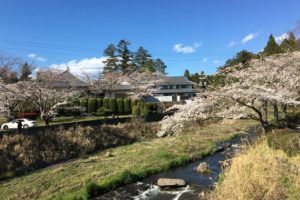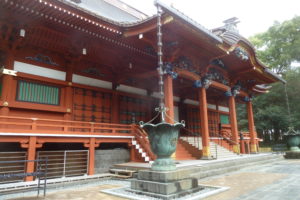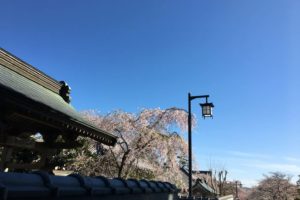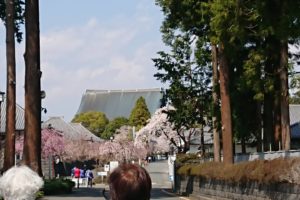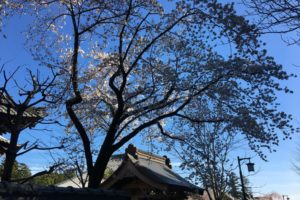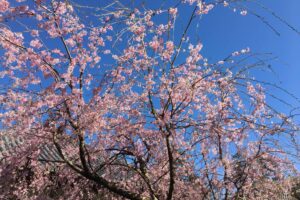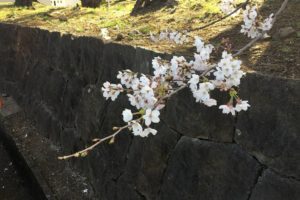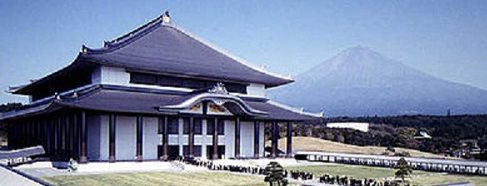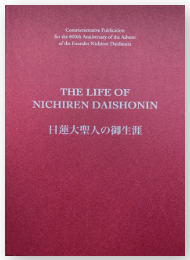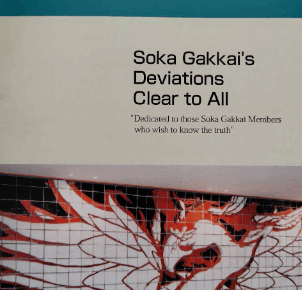In the previous stage, the host explained that the karmic cause and conduct of destroying the Buddha, the Law and the Priesthood were based on the slanderous and evil principles contained in Honen’s writing, “The Sole Selection of Nembutsu” (Senchaku shu).This meant that the fundamental cause for all suffering in the world was none other than the offense of slandering the Three Treasures, as a result of following Honen, a deluded and evil monk who had turned his back Based on this, the host referred to a principle taught in the Nirvana Sutra (Nehan gyo) and stated the following:
If we hope to bring order and tranquility to the world without further delay, we must put an end to these slanders of the Law that fill the country!
The guest then retorted by asking the host if, in order to put an end to the slanderers and to eliminate those who oppose the admonitions of the Buddha, it was necessary to condemn the m to death.This is what was stated in the passage from the Nirvana Sutra. The guest further argued that, if this were the case, then he would be inflicting injury and death upon another. He wanted to know how the host Would resolve the karmic consequences of such an action.
The guest went further, and referred to a passage from the Great Collection Sutra (Daijuku). This was the first time that the guest challenged the host by making reference to a passage from the sutra.
We must consider this to be a seriously involved and almost desperate act, since this had not occurred thus far in the heated question and answer exchange.He posed the question based on the logic and reasoning set forth in the sutra.
However, we must clearly Indeed, the guest’s question is evidently based on his strong criticism against “doing away with those who violate the prohibitions of the Buddha.” The guest cited the sutra to give weight to his question.More, he posed such a weighty question in order to assume a strong posture against the response.
The guest argued that if the issues set forth earlier by the host-in the previous stage, in which he referred to the Nirvana Sutra-were true, then slanderers must be eliminated.More, if in eliminating those who violate the precepts of the Buddha’s prohibitions, he must follow the procedures indicated in the Nirvana Sutra, then he would be forced to condemn them to death.The guest said that he was absolutely unwilling to accept this.He used the passage from the Great Collection Sutra to defend his position, citing the following words of the Buddha:
If a person shaves his head and puts on clerical robes, then, whether that person observes the precepts or violates them, both gods and men should give him alms. In doing so,they are giving alms and support to me, for that person is my son. But if men beat and abuse that person, they are beating my son, and if they curse and insult him, they are reviling me. The guest argued that this was further substantiated in the sutras by the descriptions of the consequences one must suffer for the sins of beating and abusing a priest.There was the story, for example, of the Brahmans who beat Maudgalyayana to death and descended into the Hell of Incessant Suffering.The scriptures also described how Devadatta continued to choke in the flames of the Avichi Hell for a long time, for murdering the nun Utpalavarna.
The guest concluded that if he were to commit a sin against a priest, he would inevitably bring upon himself the terrible effects If were followed expressed in the sutras. If he followed the host’s instructions and put an end to the lives of the slanderers, then he would incur the most horrible consequences.No one in his right mind would be able to perform such a horrific act if he desired peace and tranquility in his future existences. Anyone would fear the terrible consequences for such an act, He argued that the host’s instructions to punish those who slandered the Law would, in fact, cause one to violate the Buddha s prohibitions. The guest could hardly believe that such a course of action would be right. This was logical reasoning for a person who was unaware of the distinctions between the shallow and profound and the superior and inferior forms of Buddhism.
The guest’s criticism had keen logic based on the explications presented in the sutras. In the pre-Lotus Sutra teachings, there were numerous examples of those who had to face terribly evil consequences for beating a priest. Therefore, the host had to be extremely cautious in answering this almost indignant criticism launched by the guest.
The host rejected the guest’s words by stating the following:
You have clearly seen the passages from the sutras that I have cited, and yet you can ask a question like that! Are they beyond the power of your mind to comprehend? Or do you fail to understand the reasoning behind them? 1 certainly have no intention of Censuring the sons of the Buddha. My only hatred is for the act of slandering the Law.
The host further explained:
According to the teachings of the Buddhas who lived prior to Shakyamuni, in the ancient period of King Utoku and the monk Kakutoku, slanderous priests would have incurred the death penalty, But in the sutras preached since the time of Shakyamuni, priests of this type have excessive been prevented from receiving alms. Now if the four kinds of believers within the four seas and the ten thousand lands would only cease giving alms to wicked priests and instead all come over to the side of the good, then how could any more troubles rise to plague us or disasters come to confront us?
Indeed , this represented the essential teaching of the period of the Latter Day of the Law, following the passing of Shakyamuni, and it signified the truth set forth by the Lotus Sutra.
Refusing to offer alms to slanderers demonstrate that those people were the enemies of the Lotus Sutra. Destroying and slandering the Lotus Sutra severs one from the seed of Buddhism. These acts should be greatly feared.This point was made eminently clear in the illustrious passages of the Lotus Sutra stating that those who slandered the Lotus Sutra, the text of the Mahayana teachings, would suffer consequences that were more severe than those resulting from committing the five cardinal sins on innumerable Occasions. Thus, the host refuted the eluded argument of the guest by giving us explanation based on the essential truth of the Lotus Sutra, in the period of the Latter Day of the Law.
The host’s explanation demonstrate need to admonish the enemies of likes of Honen – and to stop the offering of alms to such slanderers. We must the Lotus Sutra-those who follow the recognize here that the explanation prosented by the bon wos elevated a step further and descrbed in the contest of the performance of Budthist practices in the Latter Day of the Law.
The prohibition of alms giving to slanderers also indicates the prohibition of receiving offerings from slanderers.Detesting slander in itself represents This was the essential message set forth by the scripture.It stated, “Even the most compassionate of bodhisattvas will inevitably fall into Hell if he gives alms to an enemy of the Lotus Sutra, and even the worst offender of the five. cardinal sins will be reborn into the conditions of Tranquility or Rapture, without fail, if he detests such slanderers.”
The Daishonin’s profound thoughtfulness was apparent in this writing.Represented by the host, he warned the guest against making offerings to those who uphold slanderous teachings such as Nembutsu, Zen and other sects.The guest represented Hojo Tokiyori, the most powerful man in Japan at the time.The Daishonin declared that slander was the singular cause for the disasters and calamities occurring in society.The people of Japan, who were traumatized by such terrible occurrences, were all gravely afflicted by a “disease.” He pointed out that it was the responsibility of Hojo Tokiyori to save these people from this “ailment.” The Daishonin stated:
The people of Japan today, without a single exception, are afflicted with the most serious of all diseases, the grave illness of major slander.I refer to the followers of the Zen , Nembutsu and Ritsu sects, and to the Shingon teachers.(Gosho, p. 900)
At the conclusion of the eighth question and answer exchange, the Daishonin decisively stated that “the four believers withen the four seas and the ten thousand lands(should) cease priests.” This means that presenting offerings to slanderers is tantamount to nurturing evil.The Daishonin wrote;
Those who nurture evil … are drained of healthy color; their spirits are weakened and their strength is diminished. (Gosho, p. 1321)
Indeed, the only way to diminish the occurrence of calamities and to save all humankind from misery and suffering is to admonish slanderers, halt the presentation of any offerings to them and embrace True Buddhism.,, the concluding. passage of the present, eighth stage of the Rissho ankoku-ron, the Daishonin admonished the guest by offering the following words of compassionate instruction:
If all…believers… would… all come over to the side of the good , then how could any more troubles rise to plague us or disasters come to confront us?
Nichiren Daishonin’s Buddhism will fundamentally save all the people in this world. On the road to achieving the ultimate propagation of True Buddhism through shakubuku, we will be forced to deal with the complexities of slander and heresy that will inevitably arise. before us, When we encounter these, it is essential for the believers of True Buddhism not to support slanderers and not to make offerings to them; we must single-mindedly protect and support the True Law.Admonishing slanderers does not mean at all that we must resort to force.Any action based On force would give rise to new complexities and problems.In our world of delusion and evil in the Latter Day of the Law, we must follow the wisdom of the Buddha and refrain from supporting and making offerings to slanderers.
With this, I would like to conclude my sermon for this month in gratitude to the Buddha.
